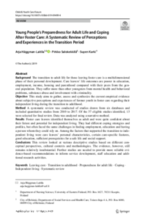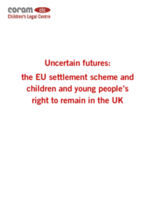Displaying 881 - 890 of 2221
This article focuses on the “zero-tolerance” policy adopted in spring, 2018, in the USA. The implementation of this policy resulted in the forced separation of children from their families and the violation of human rights of those detained in authorized facilities and foster care.
This book offers a comprehensive overview of the newest contributions to the literature on leaving care in relation to theory, in addition to the Theory of Emerging Adulthood, while also featuring cutting-edge research and best practices that support adjustment across a range of domains for this population.
This current systematic literature review aims to examine what is known about foster parents' needs, satisfaction and perceptions of foster parent training.
This open access study aims to gather, assess and synthesize the current empirical evidence about subjective perceptions and experiences of former youth in foster care regarding their independent living during the transition to adulthood.
Presented at the UN Human Rights Council side event on Promoting Quality Alternative Care for Children with Disabilities on 5 March 2019, this video highlights the work of ABLE, a program of the Cambodian NGO Children in Families that provides inclusive family-based care for children with disabilities.
The importance of mental and behavioral health for child welfare clients is well-documented; yet, little is known about the challenges therapeutic service providers (TSPs) experience working in child welfare practice. To explore this topic, five focus groups were conducted with 40 TSPs in a contracted mental and behavioral health agency and data were analyzed following an inductive thematic process.
This article presents a preliminary exploration of the participation in a mindfulness-based group therapy by nine looked after children aged 14 to 17.
This report outlines the barriers to settlement demonstrated by the work CCLC has done with children and young people and makes recommendations for the ways in which the government can ensure that these barriers can be overcome as the EU settlement scheme is rolled out.
This article follows on from ‘How children in foster care engage with loyalty conflict: presenting a model of processes informing loyalty’ (Dansey, John and Shbero, 2018), published in the previous edition of this journal.
This study uses a qualitative approach to explore the experiences of 22 UK foster carers when a child is ‘moved on’ from a placement, focusing specifically on their experiences of loss.


